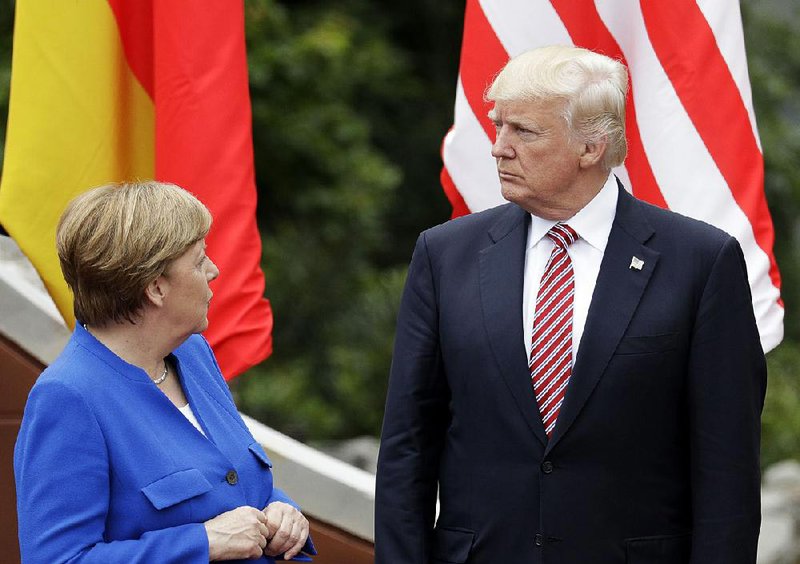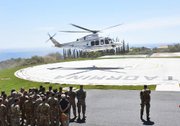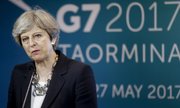TAORMINA, Sicily -- Leaders of the Group of Seven industrialized nations on Friday put pressure on Internet companies and social media sites to do more to stop the spread of "hateful ideology," appealing to their sense of social responsibility to more swiftly identify and remove terrorist propaganda.
The G-7 leaders, including President Donald Trump, on Friday also discussed climate and trade. Trump's economic adviser Gary Cohn said the president left the meetings "more knowledgeable" and with "evolving" views about the global climate accord he has threatened to abandon.
The extremism-combating measure signed by the seven nations' leaders was a show of solidarity with the United Kingdom after Monday's suicide bombing in Manchester, England, that killed 22 people outside a pop music concert. The Islamic State extremist group claimed the attack, although authorities are working to establish the bomber's ties to extremist organizations.
British Prime Minister Theresa May said the leaders agreed that the threat posed by the Islamic State "is evolving rather than disappearing."
[PRESIDENT TRUMP: Timeline, appointments, executive orders + guide to actions in first 100 days]
"As they lose ground in Iraq and Syria, foreign fighters are returning, and the group's hateful ideology is spreading online," May said. "Make no mistake, the fight is moving from the battlefield to the Internet."
She said terror propaganda is "warping young minds" and that she thinks technology companies both could do more and have the responsibility to act.
In their declaration, the leaders said they were targeting "propaganda supporting terrorism and violent extremism, online recruitment by extremists, radicalization and incitement to violence." They said they would work also with youth and religious leaders, prisons and educational institutions toward that end.
They also agreed in the declaration to strengthen the process for returning foreign fighters operating in Europe to their countries of origin, to better share intelligence on individuals who have trained in Islamic State territory, and to do more to cut off funding streams they called "the lifeblood of violent extremists and terrorists."
Climate Pact at Issue
During Friday's gathering of the Group of 7 leading industrialized nations -- as well as at earlier stops on Trump's first international trip -- leaders have implored the president to stick with the 2015 accord aimed at reducing carbon emissions and slowing potentially disastrous global warming.
German Chancellor Angela Merkel said the G-7 leaders "put forward very many arguments" for the U.S. sticking with the agreement.
"We made it clear that we want the U.S. to stick to its commitments," Merkel told reporters after the meeting on Friday. She said the discussion was conducted in a very "honest" atmosphere, leading to a "very intense exchange."
Merkel said that the U.S. side made clear that it hasn't yet taken a decision on whether to scrap the Paris accord "and won't make a decision here" at the G-7.
At the close of the day's talks, Italian Prime Minister Paolo Gentiloni said six of the G-7 nations -- Italy, Britain, France, Germany, Canada and Japan -- confirmed "our commitment and our determination" to the 2015 Paris Agreement establishing goals for reducing greenhouse gases.
The United States, meanwhile, confirmed "a period of reflection" on the matter, Gentiloni said.
"He feels much more knowledgeable on the topic today," said Cohn, Trump's adviser. "He came here to learn; he came here to get smarter."
Nearly 200 countries are part of the Paris accord, and each sets its own emissions targets, which are not legally binding. The U.S. has pledged to reduce its annual greenhouse gas emissions in 2025 by 26 to 28 percent below 2005 levels, which would be a reduction of about 1.6 billion tons of annual emissions.
After deriding climate change as a hoax and pledging to pull out of the Paris deal during his election campaign, Trump has sidestepped the issue and passed up an number of opportunities to outline his international stance toward global warming. Members of his administration are deadlocked about whether the U.S. should uphold the pact.
The Trump administration has argued that the U.S. standards are tougher than those set by China, India and others, and therefore have put American businesses at a disadvantage.
Trump also expressed concerns that other countries that had tried to dial back their climate emissions like China and India had seen job growth suffer -- and made clear he was not prepared to live with that trade-off, Cohn said.
Trump told the leaders "he didn't want to be in second place," Cohn said, especially because he ran on a platform of job creation and improving working- and middle-class opportunities and is committed to keeping that promise, Cohn said.
U.S. Influence
On Friday, G-7 leaders emphasized the United States' unrivaled influence on the world stage. Cohn told reporters that Trump was struck by "how important it is for the United States to show leadership" and how even in major international agreements, there's "a big gap when you take the biggest economy out."
White House national security adviser H.R. McMaster quickly jumped in to add that Trump would make his decisions based "on what's best for the American people," hewing to the "America First" policy that energized the president's supporters during last year's election campaign.
Before the formal sessions began, Trump met Friday morning with Japanese Prime Minister Shinzo Abe to discuss the growing threat posed by North Korea, which has alarmed neighbors with its recent nuclear and missile tests.
"It's a big problem," Trump said. "It's a world problem, and it will be solved at some point. It will be solved, you can bet on that."
Abe praised Trump, saying his visit to the Middle East and address Thursday at NATO headquarters were "successful."
After more than a week abroad, Trump will close his international trip today with additional G-7 meetings and an address to U.S. troops at a nearby air base. Unlike many of the leaders, he does not plan a news conference, meaning he'll end his trip without a formal question-and-answer session with journalists that could have included queries about the investigation back home into contacts between Russia and his election campaign.
Trump has made virtually no public remarks about the G-7 other than a tweet on Friday: "Getting ready to engage G-7 leaders on many issues including economic growth, terrorism, and security."
The G-7 summit marked Trump's final stop on a grueling nine-day trip through the Middle East and Europe. While the president was warmly received in Saudi Arabia and Israel, his reception in Europe was been more tepid given his campaign criticisms of NATO and the European Union, the continent's most powerful institutions.
The gap between Trump and other G-7 leaders on climate underscored his isolation from Europe on some major issues. The other G-7 nations were weighing whether to issue a statement at the close of the summit reiterating their support for the Paris accord, even if the United States was not included.
French President Emmanuel Macron spoke with him at length about the climate deal during a meeting Thursday in Brussels. The Vatican secretary of state, Pietro Parolin, made his own pro-Paris pitch to Trump and his advisers.
Pope Francis, who has framed climate change as an urgent moral crisis and blamed global warming on an unfair, fossil fuel-based industrial model that harms the poor, also appeared to be sending a message to Trump during their meeting. Among the three documents the pope presented as a gift was his 2015 encyclical on the need to protect the environment.
Information for this article was contributed by Colleen Barry, Sylvie Corbet, David McHugh, Julie Pace, Jonathan Lemire, Angela Charlton and Geir Moulson of The Associated Press; by Arne Delfs, Margaret Talev and Flavia Krause-Jackson of Bloomberg News; and by Philip Rucker and Stefano Pitrelli of The Washington Post.
A Section on 05/27/2017



